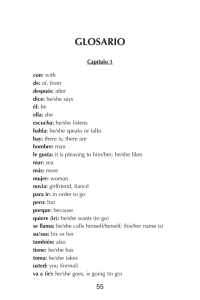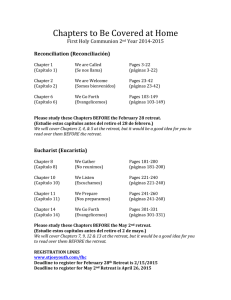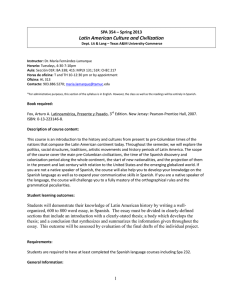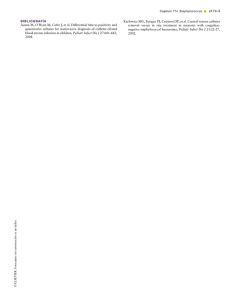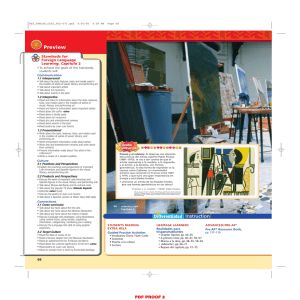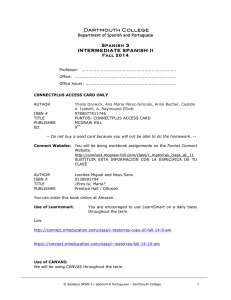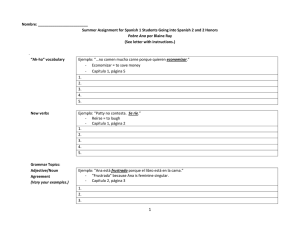SPANISH 1301 “Spanish One for Non
Anuncio
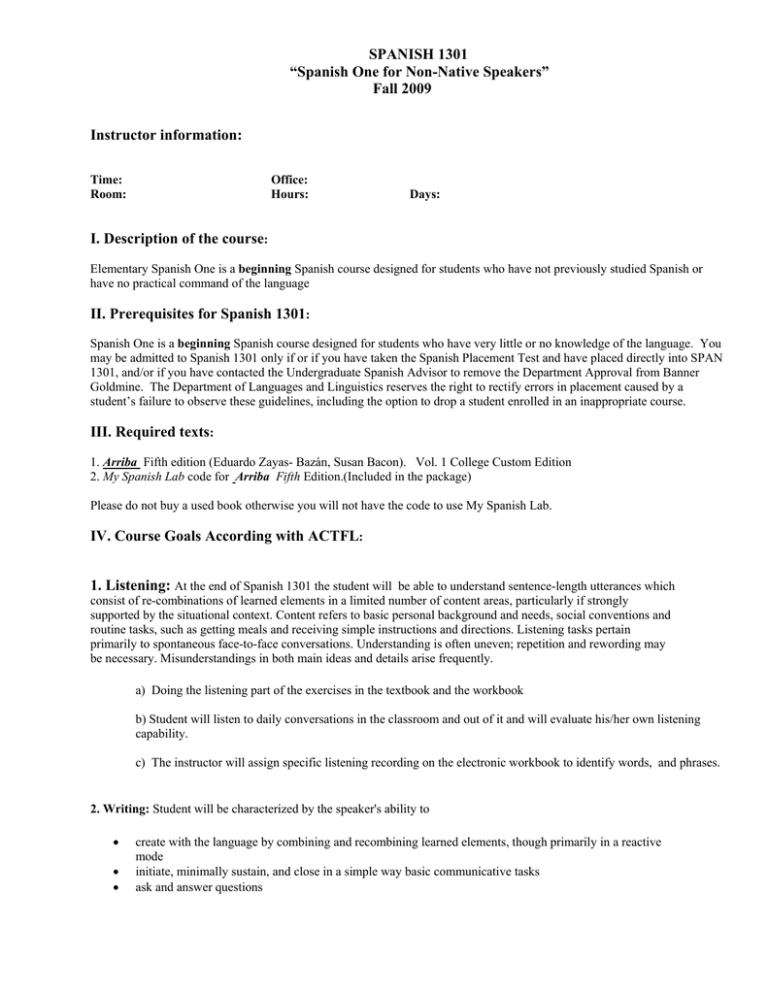
SPANISH 1301 “Spanish One for Non-Native Speakers” Fall 2009 Instructor information: Time: Room: Office: Hours: Days: I. Description of the course: Elementary Spanish One is a beginning Spanish course designed for students who have not previously studied Spanish or have no practical command of the language II. Prerequisites for Spanish 1301: Spanish One is a beginning Spanish course designed for students who have very little or no knowledge of the language. You may be admitted to Spanish 1301 only if or if you have taken the Spanish Placement Test and have placed directly into SPAN 1301, and/or if you have contacted the Undergraduate Spanish Advisor to remove the Department Approval from Banner Goldmine. The Department of Languages and Linguistics reserves the right to rectify errors in placement caused by a student’s failure to observe these guidelines, including the option to drop a student enrolled in an inappropriate course. III. Required texts: 1. Arriba Fifth edition (Eduardo Zayas- Bazán, Susan Bacon). Vol. 1 College Custom Edition 2. My Spanish Lab code for Arriba Fifth Edition.(Included in the package) Please do not buy a used book otherwise you will not have the code to use My Spanish Lab. IV. Course Goals According with ACTFL: 1. Listening: At the end of Spanish 1301 the student will be able to understand sentence-length utterances which consist of re-combinations of learned elements in a limited number of content areas, particularly if strongly supported by the situational context. Content refers to basic personal background and needs, social conventions and routine tasks, such as getting meals and receiving simple instructions and directions. Listening tasks pertain primarily to spontaneous face-to-face conversations. Understanding is often uneven; repetition and rewording may be necessary. Misunderstandings in both main ideas and details arise frequently. a) Doing the listening part of the exercises in the textbook and the workbook b) Student will listen to daily conversations in the classroom and out of it and will evaluate his/her own listening capability. c) The instructor will assign specific listening recording on the electronic workbook to identify words, and phrases. 2. Writing: Student will be characterized by the speaker's ability to • • • create with the language by combining and recombining learned elements, though primarily in a reactive mode initiate, minimally sustain, and close in a simple way basic communicative tasks ask and answer questions 3. Reading: Able to understand main ideas and/or some facts from the simplest connected texts dealing with basic personal and social needs. Such texts are linguistically noncomplex and have a clear underlying internal structure, for example, chronological sequencing. They impart basic information about which the reader has to make only minimal suppositions or to which the reader brings personal interest and/or knowledge. Examples include messages with social purposes and information for the widest possible audience, such as public announcements and short, straightforward instructions dealing with public life. Some misunderstandings will occur.. 4. Speaking: Able to satisfy partially the requirements of basic communicative exchanges by relying heavily on learned utterances but occasionally expanding these through simple re-combinations of their elements. Can ask questions or make statements involving learned material. Shows signs of spontaneity although this falls short of real autonomy of expression. Speech continues to consist of learned utterances rather than of personalized, situationally adapted ones. Vocabulary centers on areas such as basic objects, places, and most common kinship terms. Pronunciation may still be strongly influenced by first language. Errors are frequent and, in spite of repetition, some Novice-High speakers will have difficulty being understood even by sympathetic interlocutors. Student will achieve this goal thru the following process: a) Student will participate orally in the classroom and the instructor will use open-end questions to asses the speaking ability of each students. b) Instructor will give specific guide students must participate in groups to prepare specific dialogues. c) Instructor will include assignments outside the classroom, making a videotape, and doing performances in class about specific topics according with each level. V. Methodology: This course is taught in Spanish. If you don’t hear Spanish, you won’t learn it. Please try to use only Spanish when speaking in this course. The following three expressions will initially help you survive: “No entiendo” “¿Cómo se dice _______ en español?” “¿Qué quiere decir ________?” (‘I don’t understand’) (‘How do you say _______ in Spanish?’) (‘What does ________ mean?’). VI. The role of grammar: Grammar is indeed important, but if all you do is grammar drills you’ll never learn to speak the language. Instead, the student will be able to put the grammar to use in contextualized, communicative situations of the sort you’ll encounter in the classroom. Although mechanical practice is necessary, it shouldn’t dominate class time, which must be spent communicating in Spanish. To practice the grammar in class, please study the assigned pages of the textbook before you come to class. If you arrive prepared, you’ll find it easier to communicate in the target language. If you don’t understand a particular grammar point, ask your instructor. VII. Speech errors: Sometimes students are reluctant to speak for fear of making mistakes. It’s a natural part of the language-learning process to make mistakes. Your instructor will not correct every error you make, for if he/she did so, it would take you forever to communicate anything. In class, your speech errors will be corrected when they interfere dramatically with your attempt to communicate, when they pertain to the grammar structures that are being studied that day, or when they are of a sort that could embarrass you socially. VIII. Structure and sequence of Assessment and Learning activities: The variety of learning goals for this course requires a variety of learning activities and assessment. The assessments serve to give you valuable feedback about how well you are achieving the learning goals. The assessments are forward looking. “This means that if you perform these tasks satisfactorily, you can be confident that you will be able to speak, listen, write and understand the language in order to use it out of the classroom at very novice high level” IX. Individual performance components: Here are some of the activities you must do during the semester in order to learn the language. You must do this consistently: 1. 2. 3. 4. 5. Have a good knowledge of the vocabulary studied in the course. Prepare daily preparation for class: both from the book and on line exercises. Spend time working outside class. Speak and listen in and out of class. Do your regular homework from the textbook, workbook or any other assignments given by your instructor. 6. Take exams or quizzes in class. 7. Write a lot: writing assignments that include sentences and online workbook exercises. 8. Attend class regularly and on time. 9. Have confidence in your ability to use the language expressing your ideas on a subject. 10. Work effectively and productively with other students. X. My Spanish Lab: My Spanish Lab is a new, nationally hosted online learning and assessment system for elementary Spanish courses. This convenient, easily navigable site offers a wide array of language-learning tools and resources, including powerful voice tools, a flexible grade book, an interactive version of the ¡Arriba! Student Activities Manual, an interactive version of the ¡Arriba! student text, and all materials from the ¡Arriba! audio and video programs. In MySpanishLab, students are recognized as individuals with individual learning needs. For example: • Readiness Checks: At the beginning of each chapter, students may answer questions covering several grammar concepts necessary for understanding the grammar in that chapter. If the Readiness Check indicates they need help on a specific topic, they are referred to appropriate grammar tutorials for the instruction they need. • English and Spanish Grammar Tutorials: 90 short, animated tutorials teach students the English grammar they need in order to understand the Spanish grammar covered in the text. Other grammar tutorials teach or review the Spanish grammar topics covered in the course. • "Need Help" Feature: When enabled by the instructor, a "Need Help" box appears as students are doing online homework activities, providing links to grammar tutorials, e-book sections, and additional practice activities—all of which are directly relevant to the task at hand. Oral Practice With MySpanishLab, students are able to increase their oral proficiency without leaving the online environment. For example: • Audio Recording: Students can record their voices in response to oral activities from the Student Activities Manual. • Audio Feedback: Instructors can access any or all of the students' recorded audio directly from the course gradebook, then listen, enter a grade, make comments in writing, or record a response in return. • Online Oral Communication Tools: Students can engage in online communication with their classmates, either synchronously or asynchronously. XI. Criteria, Standards and Rubrics. Performance criteria and standards are essential in assuring quality work, and are critical to valid, reliable and objective evaluation of your performance in class. You will receive rubrics in advance of assignments to help you prepare the goals of our course, some of these rubrics will be used to achieve this assesment. Sequence of Learning Activities This may change, but the plan is to work on the following calendar: Calendar MWF Ago. 24 Ago. 26 Ago. 28 Ago. 31 Sep. 2 Sep. 4 Sep. 7 Sep. 9 Sep. 11 Sep. 14 Sep. 16 Sep. 18 Sep. 21 Sep. 23 Sep. 25 Sep. 28 Sep. 30 Oct. 2 Oct. 5 Oct. 7 Oct. 9 Oct. 12 Oct. 14 Oct. 16 Oct. 19 Oct. 21 Oct. 23 Oct. 26 Oct. 28 Oct. 30 Nov. 2 Nov. 4 Nov. 6 Nov. 9 Nov. 11 Nov. 13 Nov. 16 Nov. 18 Nov. 20 Nov. 23 Nov. 25 Nov. 27 Nov. 30 Dic.2 Dec. 4 Dic. 7-11 Introducción al curso Capítulo 1. Vocabulario: saludos (p. 2-7) Capítulo 1. Alfabeto y números (p. 8-13) Capítulo 1. Las estaciones del año. Comparaciones (p.14-16) Capítulo 1. Vocabulario: en la clase (p. 18-21) Capítulo 1. Artículos y sustantivos. (p. 22-23) No hay clase Capítulo 1. Adjetivos (p. 24-25) Capítulo 1. Pronouns and present tense of ser (p. 26-28) Capítulo 1. Lectura: Nuestro Mundo/Ritmos (p. 29-37) Capítulo 2. Vocabulario: ¿Quiénes somos? (p. 38-42) Writting assignment 1 :¿Cómo es usted? Capítulo 2. La hora (p. 44-47) Capítulo 2. Palabras interrogativas. Comparaciones (p. 48-52) Capítulo 2. Comparaciones (p. 53) Repaso para examen 1 Examen 1. Capítulo 2. Vocabulario: ¿Qué haces? El presente (p.54-57) Capítulo 2. El presente de los verbos –ar (p. 57-60) Capítulo 2. Verbo tener y tener que (p. 63-64) Wriiting assignment 2: sus actividades Capítulo 2. Observaciones/Nuestro Mundo (p. 65-73) Capítulo 3. Vocabulario: tus materias y los números (p. 76-83) Capítulo 3. Adjetivos posesivos. Expresiones con tener (p. 83-85) Capítulo 3. Expresiones con el verbo tener. Comparaciones (p. 85-88) Capítulo 3. Vocabulario: localidad (p. 90-94) Capítulo 3. Verbo ir (p. 95-96) Writting assignment 3 Capítulo 3. Presente de estar. Presente progresivo Ser & estar (p. 97-99) Capítulo 3. Resumen de ser y estar (p. 100-102) Capítulo 3. Observaciones/Nuestro mundo (p. 103-113) Repaso para examen 2 Examen 2. Capítulo 4. Vocabulario: un correo electrónico y la familia. (p 116-119) Capítulo 4. Verbos irregulares con cambio en la raíz (p. 119-124) Writting assignment 4 Capítulo 4. Objeto directo, a personal y objetos directos (p. 125-128) Capítulo 4. Presente de poner, salir, tener, etc. Comparaciones (p. 128-130) Capítulo 4. Vocabulario: una invitación Adjetivos y pronombres demostrativos (p. 132-136) Capítulo 4. Los adjetivos demostrativos. Saber y conocer. (p. 137-142) Capítulo 4. Observaciones Panoramas (p. 144-156) Writting assignment 5 Capítulo 5. Vocabulario: el arreglo personal Dar y decir. (p. 154-159) Capítulo 5. Verbos reflexivos (p.159-162) Capítulo 5. Comparaciones (p. 163-166) Capítulo 5. Vocabulario: vamos a limpiar. (p. 168-173) Capítulo 5. El superlativo (p.173-176) Capítulo 5. El presente progresivo (p. 177-178) Writting assignment 6 No hay clase Día de Gracias Capítulo 5. Nuestro mundo/ Observaciones (p.179-187) Examen 3. Día muerto Examen final Ver horario oficial en la página de UTEP o el periódico el Prospector Calendar TTH Ago. . 25 Introducción y bienvenida al curso. Ago. 27 Sep. 1 Sep. 3 Sep. 8 Sep. 10 Sep. 15 Sep. 17 Sep. 22 Sep. 24 Sep. 29 Oct. 1 Oct. 6 Oct. 8 Oct. 13 Oct. 15 Oct. 20 Oct. 22 Oct. 27 Oct. 29 Nov. 3 Nov. 5 Nov. 10 Nov. 12 Nov. 17 Nov. 19 Nov. 24 Nov. 26 Dic. 1 Dic. 3 Dic. 7-11 Capitulo 1. Capitulo 1. Capitulo 1. Capitulo 1. Capitulo 1. Capitulo 1. Capitulo 2. Capitulo 2. Examen 1. Capitulo 2. Capitulo 2. Capitulo 3. Capitulo 3. Capitulo 3. Capitulo 3. Capitulo 3. Examen 2 Capitulo 4. Capitulo 4. Capitulo 4. Capitulo 4. Capitulo 4. Capitulo 5. Capitulo 5. Capitulo 5. Capitulo 5. Día de Gracias Capitulo 5. Examen 3 Examen final Vocabulario; saludos (p. 2-7) Alfabeto y números (p. 8-11) Las estaciones del año. Comparaciones (p.12-16) Writting assignment 1 Vocabulario: en la clase. Artículos y sustantivos (p. 18-24) Adjetivos (p. 24-28) Lectura: Nuestro Mundo/Ritmos (p. 29-37) Vocabulario; ¿Quiénes somos?. La hora (p. 38-43) La hora. Palabras interrogativas. Comparaciones (p. 44-53)Writting assignment 2 Vocabulario; ¿Qué haces? y conjugación (p. 54-62) Verbo tener y tener que Observaciones/Nuestro Mundo (p. 63-73) Vocabulario: tus materias y los números (p. 76-83) Los adjetivos posesivos y expresiones con tener (p. 83-88) Vocabulario: localidad. Verbo ir (p. 90- 96) Writting assignment 3 Ser y estar (p. 97-102) Observaciones/Nuestro mundo (p. 103-113) Vocabulario: un correo electrónico (p. 114-119) Verbos con cambio en la raíz y a personal. (p.119-130) Writting assignment 4 Vocabulario: una invitación. (p.130-136) Los demostrativos. Saber y conocer (p.137-142) Observaciones / Panoramas (p. 143-153) Vocabulario. El arreglo personal (p. 152-162) Los reflexivos y las comparaciones (p. 153-166) Writting assignment 5 Vocabulario: vamos a limpiar. (p.168-173) El superlativo y el presente progresivo (173-178) Observaciones/ Panoramas (p. 179-187) Writting assignment 6 Ver horario oficial en la página de UTEP o el periódico el Prospector XII. Time Management: The tentative Schedule contains all assignments and deadlines in details so you can plan ahead. Expect to spend three hours on preparation and learning assignments for every semester credit hour. Since this class is a 3 credit hour class, expect to spend about 9 hours out of class on assignments for a total of about 12 hours per week to obtain a good grade in class. Please, combine the course schedules of all your classes, create your own study schedule and stick to it. XIII. Course Policies: Cheating, Plagiarism, Scholastic Dishonesty, and Student Discipline: Any student who commits an act of scholastic dishonesty is subject to discipline. Scholastic dishonesty includes, but is not limited to, cheating, plagiarism, collusion, the submission for credit of any work or materials that are attributable in whole or in part to another person, taking an examination for another person, any act designed to give unfair advantage to a student or the attempt to commit such acts. XIV. Attendance Policy: Policy on Tardiness and Missing Class Sessions: To expand your proficiency in a language, you must be present in class so as to engage in active practice there. Good attendance is a course requirement. Therefore, if you are absent an excessive number of times during the drop period—from the first day after the end of late registration through the last day for faculty to drop students—your instructor will drop you from the course. Here are the rules: During the fall or spring semester, you will be immediately dropped from your class after you’ve been absent four times in a row; and you will also be immediately dropped from class after you’ve been absent a total of six times. Once the last day for faculty to drop students has come and gone, your instructor will not drop you, but can and will lower your grade in the course as per the following absence-based table: Total number of unexcused absences over the entire semester Points by which your course grade will be lowered: 4 absences 2 points 5 absences 4 points 6 absences 6 points 7 absences 8 points Late arrivals and early departures also carry penalties for purposes of dropping or lowering the course grade: two late arrivals equal one absence, two early departures equal one absence, and one late arrival plus one early departure equal one absence. If you arrive late to class it is your responsibility to tell your instructor at the end of the class period that you arrived late but that you were indeed present, for if you don’t, it’s possible he or she will mark you absent. Exceptions to the above-stated policies are only made under these circumstances: (1) a medical emergency requiring hospitalization, (2) jury duty or (3) official UTEP business such as athletics, debating team, or band. Documentary proof of official UTEP business or jury duty must be provided ten calendar days before the fact; documentary proof of hospitalization must be provided on the day you return to class. Your instructor can also drop you for lack of effort or disruptive behavior. No cellular phones are allowed to be used in class. Please turn off your cellular phone during class time and no text messaging is allowed at any moment during class time. If you bring you computer to class please use it for class purposes and not for other personal purpose. XV. Students with any type of disabilities: The University of Texas at El Paso (UTEP) is committed to providing for the needs of enrolled or admitted students who have disabilities under Section 504 of the Rehabilitation Act of 1973 and the Americans with Disabilities Act of 1990 (ADA). Therefore, it is the policy of UTEP that the campus makes services available for any student who, through a recent assessment, can document a disability. XVI. Determination of course grade: Homework and My Spanish Lab_______15% This includes all assignments from the textbook and its workbook (electronic and printed edition), along with any other work that your instructor may assign. Homework is not accepted late. If you are absent on any given day, please contact your instructor or a classmate to find out what work was assigned but a good source of the homework is your calendar, depicted in this syllabus, and you’re My Spanish Lab page. Exception for late homework work: The following are the only conditions under which a late homework assignment will be accepted: you were absent because of a medical emergency requiring hospitalization; you were on jury duty; you were attending the funeral of an immediate member of your family; you were away on official UTEP business. Documentary proof of any of the above must be provided before or immediately after the fact. The course calendar—the last page of this syllabus—gives you a general idea of what parts of the textbook and workbook are going to be covered on any particular day; you must therefore read the course calendar very carefully. All the homework assignments that you turn in will receive full credit provided that they are complete and also handed in on time. Incomplete assignments receive only partial credit. Writing Assignmentss______________________15% You are expected to write written assignments during the semester. Each composition is to follow the guidelines that your instructor provides. All compositions must be typed and must be turned in by the scheduled date. Every time you turn in a late work your instructor will give you partial credit for that. Rubrics will be used to evaluate your written compositions. Chapter exams and final exam ________70% See the course calendar for dates of administration. Please note: There are NO “make-ups.” Your course grade will be determined as follows: Three chapter exams, each counts 15% for a total of 45% and a final exam that counts 25%. . Exam 1 ………………………….15% Exam 2 ………………………….15% Exam 3 ………………………….15% Final exam ………………………25% Total …………………………….70% Final Exam: Final exam is given during Finals Week. See the course calendar for the date. exam. It is not possible to make up or drop the final Grading scale: The following scale applies to all graded components of this course: A = 90.00-100.00; B = 80.00-89.99; C = 70.00-79.99; D = 65.00-69.99; F = 0.00-64.99.
